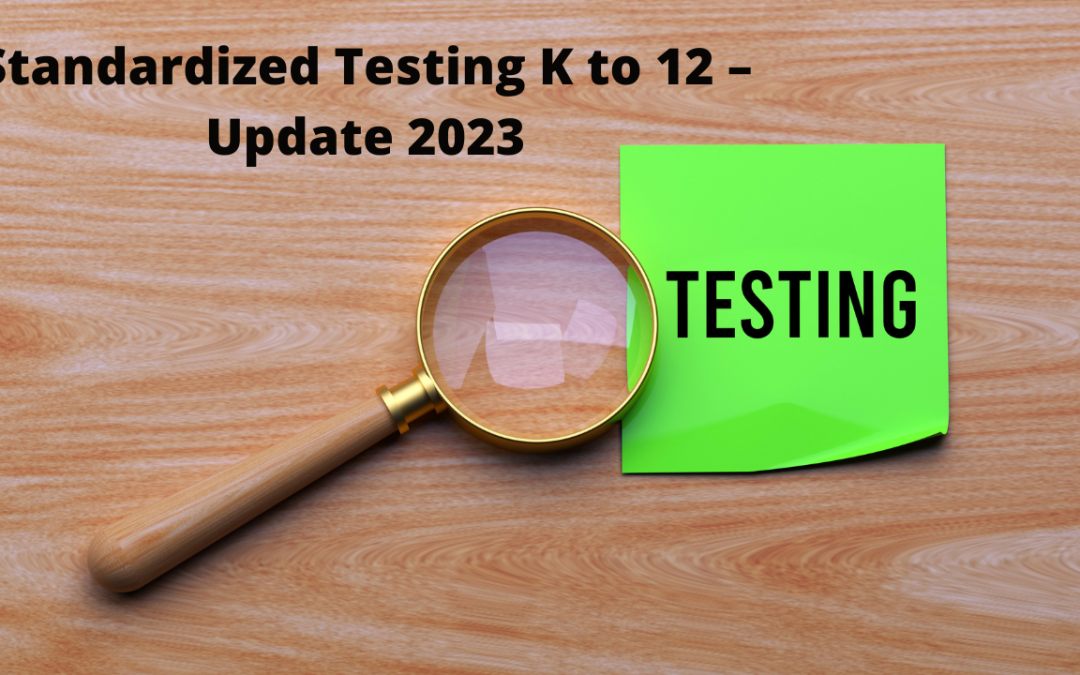The U.S. Department of Education announced in January that “States will not be allowed to cancel federally mandated standardized exams this school year despite the pandemic, though they will be offered significant flexibility in how they give those tests and how (the tests) are used.”
In a related 2023 letter, the Department announced that:
- It will not invite state requests for “blanket waivers of assessments” previously required by the Every Student Succeeds Act (States did have this option in the spring of 2022.)
- States will be allowed to administer shorter versions of state exams in English/language arts, math and science, OR
- States will be allowed to administer exams as late as this summer or perhaps even into the next school year.
- States will be allowed to seek waivers from federal requirements for school accountability, including the mandate to verify low-performing schools.
- The Department also included a waiver from the requirement that states test 95% of eligible students.
(SOURCE: States Still Must Give Standardized Tests This Year, Biden Administration Announces (edweek.org))
Education Week writer Libby Stanford reported on January 31, 2023, that a new direction in K- to-12 annual assessment is being taken by current Secretary of Education Miquel Cardona. Specifically, Cardona said in a February speech that “Standardized tests should be used as a ‘flashlight’ on what works in education, not as a ‘hammer’ to force outcomes.” (SOURCE: Education Secretary: Standardized Tests Should No Longer Be a ‘Hammer’ (edweek.org) ).
Mr. Cardona’s comments highlight a dramatic shift in perspective since standardized tests first became a part of American education in the mid-1800s. (In fact, Standardized Testing spread throughout American schools from 1838 to 1890.) The use of annual evaluative testing was hardwired into the American public education system after 2002 under the Bush administration’s No Child Left Behind Act which mandated annual testing in all 50 states.
In a January 24, 2023, speech, Cardona didn’t announce anything new related to testing policies or plans coming from the Education Department, so it’s still unclear whether the Department has any plans for addressing testing-based issues in 2023.
WHAT STANDARDIZED TESTS MEASURE
Standardized testing was originally designed to measure student performance on an individual basis, not as a measure of a public school’s performance. The idea was that an annual assessment cannot adequately measure performance for an entire school based on individual student test scores.
Annual standardized tests are meant to “measure the extent to which all students are meeting the state’s academic standards.” Each state’s standards are designed to line up with reading and math skills K to 12 students must master to succeed in first year college math and reading courses.
In a 2021 letter to the states, Acting Assistant Secretary in the Office of Elementary and Secondary Education, Ian Rosenblum, wrote that:
- States will still have to report testing data by student subgroups, as previously required.
- States are “encouraged” to extend the testing window for English-language proficiency tests.
- There is no specific deadline established at this time for when states would have to “seek flexibility from accountability or other requirements.”
- The Department recognizes that “individual states may need additional assessment flexibility based on specific circumstances,” in which cases the Department “will work with states to address their individual needs and conditions while ensuring the maximum available statewide data to inform the targeting of resources and supports.”
Until further updates are announced, current requirements will be upheld.
THE BIDEN ADMINISTRATION ON K TO 12 TESTING
On January 21, 2023, CNN news reported that current President Joe Biden “intends to end the COVID-19 national and public health emergencies on May 11.”
This means that most pandemic related government-sponsored benefits will end in May. Whether or not pandemic-related “eased” standardized testing requirements left over from 2020 and 2021 will still hold is not yet apparent.
In the meantime, FairTest.com reports that “many state legislatures (are) considering proposals to reduce standardized exam overkill at the same time public schools are gearing up to administer another round of federal-and-state-mandated assessments.”
The same FairTest article summarizes assessment reform efforts: “In both K-12 and higher education, there’s renewed energy to replace high-stakes testing hurdles with authentic measures of what students know and can do, not how well they take standardized exams.” (Assessment Reform News: February 2023 – Fairtest)
HOMESCHOOLS AND STANDARDIZED TESTING
Federally required annual testing evaluations tend to be a hot topic with home school providers. Although testing requirements do tend to vary from state-to-state, at this point in history, students attending a home school must be tested once a year through “a nationally standardized test or other nationally standardized equivalent measurement. The test must measure achievement in English grammar, reading, spelling, and mathematics” for all students and “verbal and quantitative areas for grade 11 students.”
If the federal government either revises current testing requirements or extends a full waiver from testing, the same regulations will apply to home schools. There are exceptions to this rule. In fact, some states do not require that homeschoolers participate in any form of standardized testing. (Caution: Check testing requirements for your state and be sure to comply with those requirements in a timely fashion.)
There should be more definitive testing information available for the 2023-2024 school year sometime this spring. Watch this space – when we know, you’ll know!
